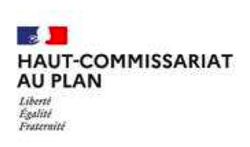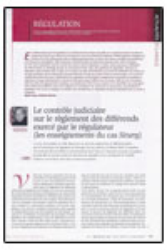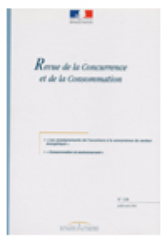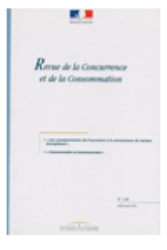Sept. 1, 2022
Thesaurus : Doctrine

► Full Reference: J.-F. Vaquieri, "Les "Buts Monumentaux" perçus par l'entreprise. L'exemple d'Enedis" ("The "Monumental Goals" perceived by the company. The example of Enedis"), in M.-A. Frison-Roche (ed.), Les Buts Monumentaux de la Compliance, coll. "Régulations & Compliance", Journal of Regulation & Compliance (JoRC) and Dalloz, 2022, p. 77-84.
____
📕read a general presentation of the book, Les Buts Monumentaux de la Compliance, in which this article is published
____
► Summary of the article (done by the Journal of Regulation & Compliance): The article aims to show how a particular company in that it is charged by the State to effectively distribute electricity to everyone in France participates in the Monumental Goals, makes them concrete and integrates them into its functioning itself. The firm Enedis, a French monopolistic State company, operator of the distribution network participates directly in these Goals under the express application of the French Energy Code.
Under the control of the Regulator, the company is responsible for the continuity of the electricity supply and responds to the challenges of energy transition, Enedis ensuring equal treatment at national and local level, Compliance thus extending Regulatory system to which this firm responds and which it internalizes. The management of personal data, energy being at the heart of the digital revolution, implies a particularly strong internal framework of Compliance. This articulation between this new Compliance in terms of personal information and this classic Compliance as a continuation of the Regulation to serve the citizen, both converging for the benefit of people, explains that Enedis has put Compliance at the heart of its commitments, particularly expressed in its code of conduct, its industrial and human project (Projet industriel et humain - PIH) and its environmental actions.
The Compliance which is specific to Enedis is disseminated by it to various entities, in particular via concession contracts, giving these an original framework. This importance of Compliance for Enedis leads the company through the "Monumental Goals" which unite it to design and maintain balances between the diversity of these so that the values carried by the companies continue to decline, especially locally.
________
Sept. 16, 2021
Thesaurus : Doctrine

► Full Reference: Vaquieri, J.-F., The "Monumental Goals" perceived by the company. The example of Enedis, in Frison-Roche, M.-A. (ed.),Compliance Monumental Goals, series "Compliance & Regulation", Journal of Regulation & Compliance (JoRC) and Bruylant, to be published.
___
► Article Summary: The article aims to show how a particular company in that it is charged by the State to effectively distribute electricity to everyone in France participates in the Monumental Goals, makes them concrete and integrates them into its functioning itself. The firm Enedis, a French monopolistic State company, operator of the distribution network participates directly in these Goals under the express application of the French Energy Code.
Under the control of the Regulator, the company is responsible for the continuity of the electricity supply and responds to the challenges of energy transition, Enedis ensuring equal treatment at national and local level, Compliance thus extending Regulatory system to which this firm responds and which it internalizes. The management of personal data, energy being at the heart of the digital revolution, implies a particularly strong internal framework of Compliance. This articulation between this new Compliance in terms of personal information and this classic Compliance as a continuation of the Regulation to serve the citizen, both converging for the benefit of people, explains that Enedis has put Compliance at the heart of its commitments, particularly expressed in its code of conduct, its industrial and human project (Projet industriel et humain - PIH) and its environmental actions.
The Compliance which is specific to Enedis is disseminated by it to various entities, in particular via concession contracts, giving these an original framework. This importance of Compliance for Enedis leads the company through the "Monumental Goals" which unite it to design and maintain balances between the diversity of these so that the values carried by the companies continue to decline, especially locally.
____
______
March 26, 2021
Thesaurus : Soft Law
Référence complète : Haut Commissariat au Plan : Electricité : le devoir de lucidité , note du 26 mars 2021.
March 23, 2021
Thesaurus : Soft Law

Full reference: Bayrou, F., Electricité: le devoir de lucidité (Electricity: the duty of lucidity), note n°4 from the Haut-Commissariat au Plan (French government planification agency), 23rd of March 2021, 37 p.
Read the note (in French)
Read the summary of the note done by the Haut-Commissariat au Plan on is official website (in French)
Aug. 24, 2020
Newsletter MAFR - Law, Compliance, Regulation

Full reference: Frison-Roche, M.-A., The control by regulator of the essential infrastructure manager's investment plan: example of electric network and the notion of "doctrine", Newsletter MAFR - Law, Compliance, Regulation, 24th of August 2020
Read by freely subscribing other news of the Newsletter MAFR - Law, Compliance, Regulation
Summary of the news
On 31st of July 2020, the Commission de Régulation de l'Energie (CRE and French energy regulator) has examined the investment plan of the French electric network manager (RTE) as it does every year. This investment plan is an economic document but it also contains societal purposes, especially the adaptation of the electric network in order to integrate renewable energies.
The control by the CRE is not a financial control. The crucial operator (RTE) is free to decide the way it wants to manage its budget. The CRE just advices on the financial side by recommending for exemple to be more flexible in its financial strategies. The true CRE's control is about the investment plan's general orientations, the methodology of needs analysis and crucial operator's investment choices which must be aligned with those of the regulator.
Such a control leads to the emergence of an "investment doctrine" from the side of the crucial operator, mixing its own choices and the regulator's guidelines. Beyond this, the elaboration of the investment plan is the result of a true co-writing between the regulator and the firm which discuss together, exchanges points of view and methods. Such a method, expressing a kind of coregulation, could be used in other sectors.
May 17, 2017
Thesaurus : Doctrine

Référence complète : Beltran, A., Derdevet, M., Roques, F., Énergie. Pour des réseaux électriques solidaires, Descartes & Cie, 2017, 236 p.
Lire la 4ième de couverture.
Lire la table des matières.
Lire la conclusion.
Oct. 15, 2014
Publications
 Référence complète FRISON-ROCHE, M.-A., La concurrence, objectif adjacent dans la régulation de l'énergie, in BEHAR-TOUCHARS, Martine, CHARBIT, Nicolas et AMARO, Rafael (dir.), À quoi sert la concurrence ?, Paris, oct. 2014, p.423-428.
Référence complète FRISON-ROCHE, M.-A., La concurrence, objectif adjacent dans la régulation de l'énergie, in BEHAR-TOUCHARS, Martine, CHARBIT, Nicolas et AMARO, Rafael (dir.), À quoi sert la concurrence ?, Paris, oct. 2014, p.423-428.
Le droit économique se concevant d'une façon instrumentale, il se dessine et s'apprécie à partir des buts qu'il sert et poursuit.
L'instrument juridique est utilisé pour sa puissance normative dans le secteur de l'énergie. Il l'est parfois dans l'objectif de la concurrence, mais celui-ci est difficile à atteindre, comme le montre la force d'inertie des systèmes nationaux.
Cela peut paraître contrariant mais fondamentalement la concurrence n'est pas l'objectif principal du secteur de l'énergie. La concurrence n'en est pas exclue : elle est son objectif adjacent.
Ainsi, lorsque la concurrence permet au consommateur de plus aisément bénéficier du bien commun, elle est bienvenue. Lorsque la concurrence fait s'articuler à la fois la protection de l'environnement, le souci de l'eau, la construction du lien social, l'autonomie à long terme, la sécurité, elle est de droit. Mais lorsqu'elle ne concrétise pas spontanément ces objectifs, elle n'est pas première.
La concurrence ne peut alors que venir en soutènement du droit de la régulation, y compris dans la dimension politique de celui-ci. C'est alors aux États ou aux politiques de l'Union européenne de prendre le pas sur une application mécanique et neutre de l'ajustement des offres et des demandes.
Lire le working paper sur lequel l'article s'appuie et dans lequel les références techniques sont disponibles.
Feb. 9, 2005
Publications

Référence complète : FRISON-ROCHE, Marie-Anne, Le contrôle judiciaire sur le règlement des différends exercé par le régulateur (les enseignements du cas Sinerg), Revue Lamy Concurrence, n°3, mai/juillet 2005, pp.107-110.

April 3, 2003
Organization of scientific events
July 22, 2002
Publications

Référence complète : FRISON-ROCHE, Marie-Anne et HENRY, Claude (dir.), Les enseignements de l’ouverture à la concurrence du secteur énergétique, Revue de la concurrence et de la consommation, n°128, juillet 2002.
July 22, 2002
Publications

Référence complète : FRISON-ROCHE, Marie-Anne, « Introduction » in Les enseignements de l’ouverture à la concurrence du secteur énergétique, Revue de la concurrence et de la consommation, n°128, juillet 2002, pp.6-8.
Feb. 16, 2001
Publications
Feb. 10, 2000
Thesaurus : 02. Lois
Lire le texte de la loi, dans son état actualisé en avril 2015.
Cette loi transpose la directive communautaire de 1996 qui imposa le principe de libéralisation du secteur énergétique. C'est pourquoi elle mit en place la Commission de Régulation de l'Électricité, qui devait devenir après la libéralisation du gaz la Commission de Régulation de l'Énergie (CRE).
Sept. 11, 1999
Publications
Référence complète : FRISON-ROCHE, Marie-Anne, Transcription en droit français de la directive européenne sur l’électricité, in La libéralisation du secteur électrique, numéro spécial du Bulletin d’information des cadres, Institut de Management EDF-GDF, 1999, n°39, pp. 65-71.
Sept. 9, 1999
Publications
Référence complète : FRISON-ROCHE, Marie-Anne, Droit de l’énergie, droit à l’énergie, in La Revue de l’Énergie, numéro anniversaire 50 ans, sept. 1999, pp. 615-618.
June 23, 1999
Publications
Jan. 16, 1998
Publications
May 13, 1997
Publications
Référence complète : FRISON-ROCHE, Marie-Anne, La directive relative au marché intérieur de l’électricité, en elle-même, in La déréglementation de l’électricité : quels enjeux pour l’Europe ? , Économie et sociétés, PUG, 1997, p.137 s.